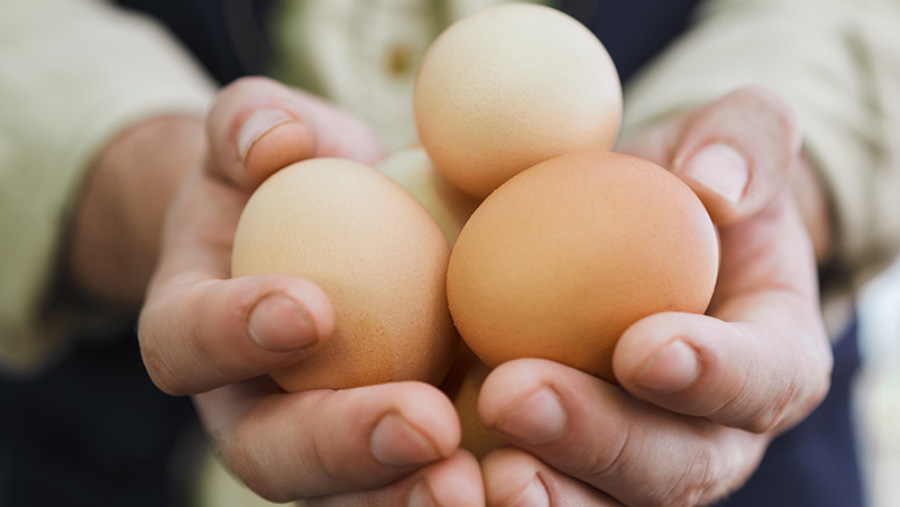Advertiser content
Sunny side up: Egg producer cuts energy costs with solar
Highland Eggs owner Gordon Whiteford tapped into the potential of solar energy to help him supply power to his business at a lower cost.
As energy prices remain high, poultry and dairy farmer Gordon Whiteford has embraced a sustainable, more cost-effective future by investing in solar technology for his business.
Gordon runs his company, Highland Eggs, from the 150-hectare Lower Mill of Tynet Farm in Moray, in the north-east of Scotland, along with his wife, June.
The farm is mixed, with some arable land, 40 cows, a small flock of sheep, and 9,000 free-range laying hens and 6,000 organic-laying hens, producing award-winning brown and white eggs.
With Lombard’s support, Gordon recently installed 120 solar panels on the roofs of his hen sheds, to produce 40 kw of energy for the farm.
He also received financing for new, multi-layered laying machinery which feeds and waters the birds and collects the 90,000 eggs they produce every week.
Gordon says: “We already had 12kw of solar energy, and Lombard helped us with the additional investment to expand that. With the price of electricity going up so much, we decided it was the right time.”
Gordon says that although the purchase of the panels increased his costs initially, the additional units were needed to help power his expanding milking operation, which can be a high energy consumer.
“It’s an investment for the future because once the panels have been paid off, they’ll still be producing electricity for you, and there’s very little upkeep required,” he says.
“First and foremost, you’re always trying to make a decent margin, but anything you can do to make yourself more sustainable helps – and it’s good to put that message out there so that people can support you.”
Serving the community
The bulk of the eggs produced on the farm find their way into supermarkets like Aldi and Lidl via wholesalers or are purchased by hotels and restaurants.
But, eager to serve the local community, Gordon has installed five vending machines in the farm shop, where visitors can purchase eggs and other farm produce like milk – dispensed in reusable glass bottles – milkshakes and home baking. He also has plans to install an ice-cream vending machine as his dairy operation grows.
“That’s a pretty good source of income for us,” says Gordon. “And it’s a nice way to have a closer connection with our neighbours here.”
After studying Agricultural Business Management, Gordon received financing from the Prince’s Trust and a local enterprise grant to get his organic egg business off the ground in 2005.
From there, he managed to secure a tenancy with Crown Estates in 2012, which meant he was able to expand the farm and build a packing facility on site.

© Lombard
He spent a year studying animal-welfare best practices through a Nuffield Scholarship and now applies these techniques on the farm.
Not only does this help to improve the environment but also lets Gordon produce higher quality produce.
His ambition is to develop his business further, and he is especially keen to grow his dairy herd, despite it being an unusual practice in his region.
“Dairy farming is quite rare in this part of Scotland now, so everyone thought we were a bit crazy when we decided to develop a dairy herd, but we’ve grown it organically,” he says.
“It’s quite successful because there isn’t much competition, and the milk is locally produced and doesn’t have to be brought in on lorries from further afield. We sell about a third of our milk directly through our own vending machines too, so there is a good margin for us.”
Threat of avian flu
Despite the recent success of Highland Eggs, building the business from the ground up hasn’t been without its challenges. There is the threat of avian flu – which has the capacity to wipe out entire flocks – and higher feed prices.
But with careful cash flow management, and a philosophy of always putting the hens’ welfare first, Gordon hopes he can continue his profitability and maintain the standards of hygiene and care on the farm.
“We’re quite lucky in that we have a healthy retail market for eggs in the UK, and because we pack our own eggs, we have control of the price,” says Gordon. “We have to stay on top of hygiene, but our hens are cared for to the highest welfare standards.”
Lombard’s agricultural relationship manager, Adam Peters, says: “It’s great to help our customers become more sustainable through our support. We’re helping them not only potentially reduce their own carbon footprints, but potentially save them money in the long term, enabling them to invest that money elsewhere in the business.”
Find out more about how Lombard might be able to help you grow your agricultural business.
Security may be required. Product fees may apply. Business use only. Subject to status.
Provided by
NatWest Group is proud to have stood behind the agricultural sector for nearly 300 years, recently we confirmed a £1.25 billion lending package for farmers to support them with the current economic and sustainability challenges.
Lombard, our Asset Finance Partner, could enable you to buy or lease new machinery, equipment or vehicles. Our dedicated agricultural specialists across the UK are accredited by Charted Banker and here to support you, to manage and grow your business, transform the way you work, improve efficiencies and, ultimately, your bottom line.
